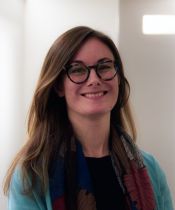‘And how are the children?’: Rev. Daryn Bunce Stylianopoulos leads a sacred reimagining of faith formation for the youngest among us
VALLEY FORGE, PA (05/13/2025)—For the Maasai people of Kenya, the subject of societal health is broached with a simple question: “And how are the children?” Reflecting a cultural conviction that the health of a community is best measured by the well-being of its youngest members, it is the Maasai’s way of asking, “Are we well as a people?”
Sensing its deeply embedded truth, Rev. Daryn Bunce Stylianopoulos, a pastor ordained in the American Baptist tradition, similarly carries the Maasai’s polite inquiry close to her heart. And as the newly appointed program director of American Baptist Home Mission Societies’ (ABHMS) Nurturing Children Initiative, she further hears in it a resounding call to help congregations embrace the challenge of affirming the well-being of the youngest in their midst.
The Nurturing Children Initiative, underwritten by a five-year, $1.25 million grant from Lilly Endowment Inc., invites American Baptist congregations to move beyond traditional models of children’s ministry by engaging children up through age 12 in worship, prayer, and community life in developmentally appropriate, spiritually enriching, and theologically grounded ways. For Stylianopoulos, her new role is a natural extension of a life shaped by love, belonging, and a belief in the sacred dignity of every child.
A Life Rooted in Ministry
A native Southerner, Stylianopoulos grew up in Lexington, North Carolina, where she was immersed in Baptist congregational life at Coggins Memorial Baptist Church and surrounded by a deep culture of faith and service. Her grandfather was the church’s pastor, and her grandmother and then her mother were its music ministers. Her father, a lawyer by vocation, was a deacon and Sunday school teacher there.
In Stylianopoulos’ words, “I’ve never lacked for love. I’ve always had people who saw my gifts and affirmed them.” Yet her calling to ministry unfolded gently.
Stylianopoulos acknowledges that she was raised in a tradition that did not initially affirm women as pastors, yet she found herself drawn repeatedly toward ministry roles. Paraphrasing theologian Frederick Buechner, she reflects, “Wherever your feet go, that’s who you are”—and for her, the path she walked always led to spaces of care, teaching, and prayer.
Wanting to be near her siblings and cousins after graduating from high school, Stylianopoulos remained in North Carolina. She departed Lexington to attend nearby Wake Forest University, a nonsectarian institution in Winston-Salem with deep Baptist roots. There, she became fully engrossed in the campus’ ecumenical life, an experience she remembers fondly.
“Wake Forest offered opportunities for me to deeply interrogate and expand my faith perspectives through respectful dialogue with other students and professors,” Stylianopoulos reflected years later in an interview with online alumni publication DeacLink. “Those conversations and experiences broadened my understanding of God and the breadth of God’s compassion and inclusive love, and allowed me to more fully appreciate the beauty of interfaith dialogue and engagement.”
Resettling in New England
While attending the university, Stylianopoulos met her future husband, Spiro, a Wake Forest alum from Massachusetts. They began to contemplate the life they would have together after her 2003 commencement, and outlines of a new and exciting reality started to materialize.
As newlyweds, the couple moved to the Boston area, settled in, and soon started a family. In her early years of motherhood, Stylianopoulos was joyfully engrossed in raising her three children. Yet over time, she was also experiencing a growing sense of vocational call. After nearly a decade, she was ready to answer it and enrolled at Boston University School of Theology, renowned for its prophetic scholarship and social engagement.
Stylianopoulos’ first theology course, which she describes as “a toe-in-the-water experiment,” quickly confirmed what her heart already believed: Boston University was a natural fit. “That one course was all it took,” she said. “I was in.” She went on to earn a Master of Divinity in 2015.
Ministry at the Crossroads of Justice and Imagination
Since graduate school, a spirit of collaborative hopefulness has animated Stylianopoulos’ pastoral service for Boston-area Baptist congregations. As senior pastor of First Baptist Church in Needham, MA, she facilitated and accompanied the merger of that congregation with First Baptist Church in Jamaica Plain, where she remained in a position of pastoral care. She then transitioned to First Baptist Church in Newton, her latest congregation. As Pastor of Faith Formation and the Arts, she nurtured young spiritual lives and blended them into the larger congregation by developing curriculum for children and youth programming around acts of listening and storytelling.
Stylianopoulos also likens her ministry to the work of a threadsmith, weaving together, not colorful yarn, but skeins of story, justice, art, and sacred belonging. One such tapestry became the Welcome Table, a nonprofit she and her three younger sisters founded in 2020 at the height of the pandemic. “This was our effort to bridge division and foster respectful dialogue and inclusive conversation in our communities at a time of increasing rancor,” she said.
Years later, the siblings’ collaboration continues to thrive as a valued source of uplifting reflections and other published resources for an expanding audience. The Welcome Table grew naturally from a shared upbringing, which Stylianopoulos describes as a rich childhood of community, creativity, and steadfast love. Being part of her sisters’ lives and nurturing things together “has always been second nature to me,” she said.
All of her pastoral and entrepreneurial work “is about making sure people know they are beloved,” Stylianopoulos asserts, adding, “And children—especially children—need to know they are loved and valued by God.” In her view they are not only the future of the church but also “are its present, and have wisdom to share now.”
Although her rigorous education and lived experience equip Stylianopoulos well for her new leadership role, she still approaches the Nurturing Children initiative with humility. “I’m hopeful that I still have a lot to learn and that we all have a lot to learn from one another,” she said.
Rethinking Church, Child by Child
Central to the initiative is the bold but simple premise that children are integral to vibrant congregations. Children belong in the church at the center of the community of faith as full participants in prayer, worship, and service. “It’s not that churches don’t care about children,” Stylianopoulos explained. “It’s that for a long time we’ve assumed children are best formed apart from the adults—somewhere else.”
The initiative encourages congregations to embrace intergenerational worship and prayer, where children are not only present but actively engaged. Stylianopoulos recalls one Sunday when children in her congregation helped lead the prayers of the people. “Even for adults, it can be an intimidating thing, but with accompaniment [the children] rose to the occasion,” she said. “And the church was blessed by it.”
Stylianopoulos revealed that participating churches will receive coaching, collegiality, support, and shared learning opportunities with other members of a cohort yet to be formed. They will be encouraged to experiment with small but meaningful changes from the outset: children reading Scripture during worship, helping collect the offering, acting out Gospel stories, offering prayers with gentle support from adults. They will also have an opportunity to cultivate initiatives of their own imagining for the faith formation of children in their contexts of worship and prayer.
In addition, congregations identified as already engaging in meaningful ministry with children will be invited to share their successes. “There are small congregations doing extraordinary things with very few resources,” said Stylianopoulos. “They don’t have a hundred kids, but they have the heart, the creativity, and the vision.” Change, she acknowledges, may come in “baby steps.” However, each step is a seed planted in faith.
A Wide and Welcoming Net
Stylianopoulos is clear that the Nurturing Children Initiative casts a wide net. Churches bustling with children, and churches where the pews have grown quiet are both invited to reimagine their vocation to nurture the young. “Even if children aren’t present in the sanctuary, the call to nurture them still stands,” she said. “We are responsible not only for the children among us but also for those in our broader communities.”
Participation in the initiative also demands that a congregation not merely aspire to inclusivity but treat it as a central pillar to its mission. One full year will be dedicated to understanding how to nurture children with disabilities, with diverse learning and neurological needs, and from racially or socioeconomically marginalized communities. Stylianopoulos stresses the importance of flexibility: “There isn’t one model that works for every community. We have to listen deeply, and we have to be willing to learn along the way.”
The Nurturing Children Initiative is intended to stimulate innovation. However, Stylianopoulos acknowledges that select historic practices—children’s sermons, Sunday school, and age-specific “ministries—continue to have value. “This isn’t about erasing those spaces,” she explained. “It’s about discerning how to balance them with new shared worship opportunities and find the most life-giving way for each congregation to fully honor the spiritual lives of children.”
Imagination as Sacred Practice
For Stylianopoulos, imagination is not merely a childhood pastime but a spiritual necessity. “If we want to change what isn’t right in the world, we have to be able to imagine something better,” she said. “Children know how to do that. They play. They invent. They create worlds we forget how to see.” In her vision, churches that invite the playfulness, storytelling, and creativity of children into worship are not lowering their standards of reverence. Rather, they are opening themselves to deeper encounters with God.
Reflecting on what she does to nourish her own faith, Stylianopoulos cites a variety of practices she uses to ground her body while lofting her spirit. Many stimulate her imagination and creativity directly, while others achieve these ends obliquely. “I enjoy singing, gardening, ceramics, and even CrossFit,” she said. These outlets remind her that for adults and children alike, faith is lived not only in thought but also in movement, creativity, and joy.
What Success Looks Like
When Stylianopoulos casts her vision forward five years to the conclusion of the Nurturing Children Initiative and expresses her hope for what will come of this work, she does not talk about metrics or flashy reports brimming with analytics. She imagines a subtler, more enduring fruitfulness: “If a child could stand up ten years from now and say, ‘I knew I belonged there. I knew Jesus there. I learned to pray. I learned that my gifts mattered,’ then we will have done something good and lasting.”
The ultimate goal is not simply to adapt programs or tweak services. It is to reshape the very heart of how congregations understand children as being full members of the body of Christ, called and gifted by God.
A Church Worth Imagining
Stylianopoulos recognizes the challenges ahead, including the inertia of old patterns, the discomfort with noise and imperfection, the temptation to keep children politely at the margins. Yet, she moves forward with hope rooted deeply in the Gospel. “Jesus welcomed the children, not as a favor to them, but as a revelation to us,” she said. “In becoming like children—curious, open, eager to love—we find our way more deeply into the Kingdom of God.”
And so, the question—“And how are the children?”—echoes. In the steady hands of Rev. Daryn Bunce Stylianopoulos, the answer may soon ring with greater hope.

